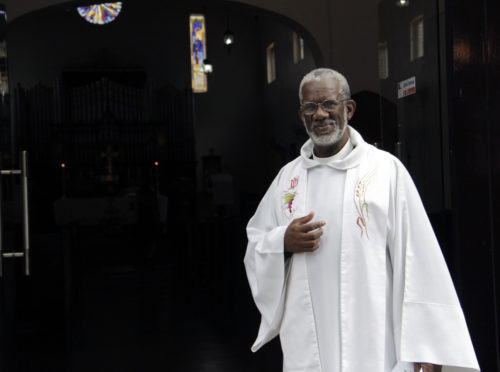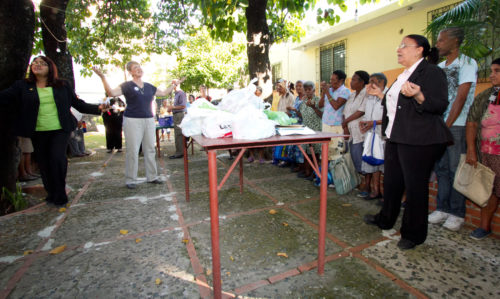Education always a part of Ashton Brooks’ vocationFirst dean of Santo Domingo’s Epiphany CathedralPosted Mar 18, 2014 |
|
A series of articles about Episcopal cathedral deans is available here.

The Very Rev. Ashton Brooks is the dean of Epiphany Cathedral in Santo Domingo, in the Diocese of the Dominican Republic, and dean of the Center for Theological Education, the seminary of Province IX. Photo: Lynette Wilson/Episcopal News Service
[Episcopal News Service – Santo Domingo, Dominican Republic] Serving the church is in the Very Rev. Ashton Brooks’ blood.
Brooks, the dean of Epiphany Cathedral, is one of more than 10 in his family, seven still serving in active ministry, to have served the church. He has been ordained and engaged in active ministry for 45 years.
The Diocese of the Dominican Republic designated Epiphany a cathedral after Brooks returned to the Dominican Republic four years ago. Throughout his ministry, Brooks has served the church from the United States, the Caribbean and from points throughout Latin America, including the Dominican Republic, but before returning “home” this last time he served 10 years as the dean of the Cathedral Church of All Saints in Saint Thomas, Virgin Islands.
“I came back because I am a dreamer,” said Brooks, who was born in the San Pedro de Macorís, a community about an hours’ drive east along the Caribbean coast.
Brooks also serves as the dean of Center for Theological Studies, which shares property in the Gazcue section of Santo Domingo with Epiphany Cathedral. The center now serves as the official seminary of Province IX, including seven Episcopal dioceses spread across the Caribbean, Central American and northern South America. At present there are five resident seminarians, four Dominicans and an Ecuadorian.
His dream, he explained, is to expand the Center for Theological Studies and move it to another location.
An emphasis on education has been at the heart of Brooks’ ministry. It’s also a top priority of the Diocese of the Dominican Republic where about half of the diocese’s 55 missions have affiliated schools, reflecting the church’s commitment to education.
“The churches and the schools have moved hand-in-hand in this diocese,” said Brooks. “The way to help people out of dire straights is to give them the opportunity for education.”
When asked about what drives him, Brooks thought back to classes he took at Harvard Divinity School with Old Testament scholar Paul Hanson, who in addition to teaching at Harvard taught Sunday school. Hanson would say that his academic accomplishments didn’t mean a thing if he wasn’t “able to relate to children at Sunday school,” said Brooks.

Epiphany Cathedral is located in the Gazcue section of Santo Domingo. The Episcopal presence in Santo Domingo dates back to 1918 Photo: Julius Ariail
Moving the seminary from the cathedral would also have the added benefit of freeing up the space to add a primary school to the cathedral’s outreach ministries, said Brooks. In addition to worship services, the cathedral runs a weekly feeding program, a monthly food pantry, the Helen F. Kellogg English-language library and a daycare for las ovejitas, “the little sheep,” among other programs to serve the community.
“Education is the road to help people in their lives,” he said. “My vocation has always been education.”
Brooks previously served the Center for Theological Studies in the late 1970s and 1980s, and later also directed the Center for Theological Reflection in San Jose, Costa Rica.
Brooks graduated the Autonomous University of Santo Domingo, the oldest university in the Americas, and also earned degrees from the Episcopal Seminary of the Caribbean, formerly located in Puerto Rico, and The General Theological Seminary in New York. He also studied at Episcopal Divinity School in Cambridge, Massachusetts. Church Divinity School of the Pacific, the Episcopal seminary in Berkely, California, awarded him an honorary doctorate in 1993.
Interestingly, it was during Brooks’ compulsory military service, during Rafael Trujillo’s military regime, when he realized he was called to serve the church. Each morning Brooks would lead a Bible study as an incentive for the soldiers to be on time for the 4 a.m. drill, he said.
“’The Lord is carrying you to this service’” he was told at the time, he said, and it was then he began exploring ministry.
On Sunday mornings, Epiphany hosts two services, one at 8:45 a.m. in English, which is lightly attended, the other at 10:45 a.m. in Spanish that draws a much larger crowd.

Epiphany Cathedral hosts a monthly food pantry called “Lazarus’ Basket,” in addition to hosting a weekly breakfast feeding program. Photo: Julius Ariail
During an interview with Episcopal News Service in his office at the cathedral, Brooks explained that the Episcopal presence in Santo Domingo dates back to 1918, two years after the United States occupied the island, an occupation that lasted until 1924.
At first, the Episcopal presence began as a mission serving the English-speaking U.S. military and their families and the expat community.
“Ministering in English to English-speaking people in Latin America,” said Brooks, adding that English-speaking Anglicans don’t always remember that there are Spanish-speaking Anglicans, as well. “The stereotype is that they are all former Roman Catholics.”
(Brooks’ great-grandmother on his father’s side was Anglican.)
Both as a scholar and a teacher, Brooks has worked to discover, interpret and articulate the Bible in a way that reflects the uniqueness of the people and the culture of Latin America.
He sees his ministry as rooted in “trying to help people seek peace and understanding among each other.”
— Lynette Wilson is an editor/reporter for the Episcopal News Service.

Social Menu